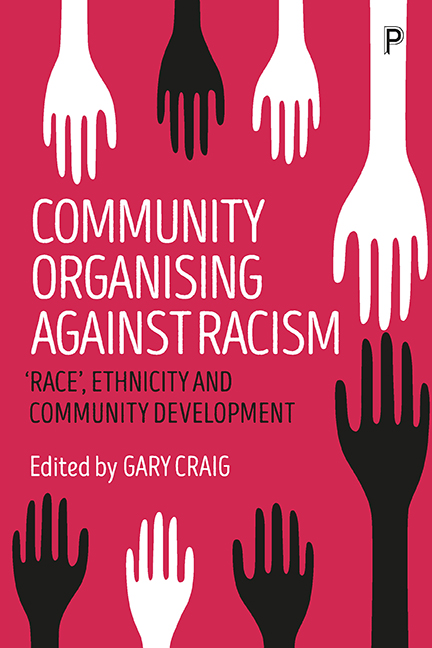Book contents
- Frontmatter
- Dedication
- Contents
- List of figures
- Author biographies
- List of abbreviations
- Introduction
- Section One Community development with ethnic minorities: history, theory, policy
- Section Two Building capacity with BME groups
- Section Three Working with Roma communities
- Section Four Global experience
- Section Five Working across cultural boundaries: ideological and personal reflections
- Afterword: Messages for community development in working with minority groups
- Index
Section One - Community development with ethnic minorities: history, theory, policy
Published online by Cambridge University Press: 12 April 2022
- Frontmatter
- Dedication
- Contents
- List of figures
- Author biographies
- List of abbreviations
- Introduction
- Section One Community development with ethnic minorities: history, theory, policy
- Section Two Building capacity with BME groups
- Section Three Working with Roma communities
- Section Four Global experience
- Section Five Working across cultural boundaries: ideological and personal reflections
- Afterword: Messages for community development in working with minority groups
- Index
Summary
The two chapters in this introductory section offer differing but complementary perspectives on community development with minority ethnic groups, each incorporating elements of the ideological, political, theoretical and historical.
Afridi traces the historical development of public policy towards racialised minorities in the UK, particularly through the lens of the concept of representativeness, showing how the British state has historically pursued a divide and rule strategy, working with what it regards as ‘good minorities’, that is, those that can be relied upon to accept the state's analysis of the origins and nature of social and political problems and can thus be accredited with the description of being representative of minorities, and dismissing those that do not (and, for example, take their protests to the streets) and that are therefore marginalised further by being labelled as unrepresentative and thus remain effectively unheard in any real political sense. As the British state has become more confident of its ability to control the way in which the issue of ‘race’ is defined (or indeed, as recent events have shown, ‘invisibilised’: see, for example, Craig, 2013), many organisations at local and national level that might lay real claim to some degree of representativeness have been closed or undermined, leaving the voice of minorities in the hands of informal selected (more accurately, patronised) groups and individuals. ‘Race’ is now, in the view of the British (and doubtless other) state/s, an issue of the past.
Bowler goes to the invisible heart of the matter when he brings into view the underlying ‘white standards’ that, he argues, underpin dominant cultural practices and that have been have been a ‘core component perpetuating racialised hostile environments since the British state's [legislative and political whitewashing] of national citizenship’. This dominant (but denied) white supremacy is demonstrated at present in the UK, where, as Afridi also argues, government claims that we live in a post-racial society are set against a backdrop of rising forms of racism against all forms of minority ‘other’ (whether asylum seeker, settled minority citizen or migrant worker), and in all areas, whether housing significant minority populations or not.
- Type
- Chapter
- Information
- Community Organising against Racism'Race', Ethnicity and Community Development, pp. 23 - 24Publisher: Bristol University PressPrint publication year: 2017



